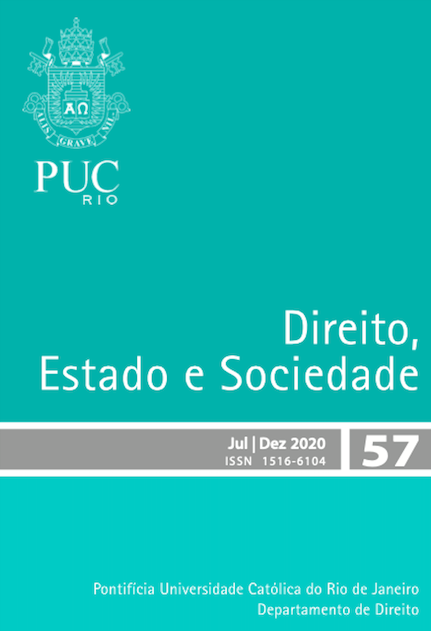A ideologia dos Direitos Humanos: sobre a semiótica de ter direitos e a política em ser humano
DOI:
https://doi.org/10.17808/des.57.1342Palavras-chave:
ideologia, Direitos Humanos, semiótica, Greimas, RancièreResumo
Nas Declarações de direitos do século XVIII, direitos são definidos como sendo universais e independentes de status social. Eles são tidos como verdades "autoevidentes", não uma pretensão ou um objetivo político, e todas e todos os possuem desde o nascimento, sem depender de reconhecimento estatal. Contudo, o rescaldo das revoluções liberais e a história dos séculos seguintes não cessou de pôr essa afirmação em xeque. Nesse trabalho, meu objetivo é apresentar não uma defesa ou um ataque aos direitos humanos, mas entender o que eles são. Para isto, contudo, acredito que precisamos indagar o que significa "ter direitos", isto é, investigar a semiótica envolvida no discurso de direitos. Por essa razão, eu evitarei entrar na discussão que busca encontrar o conteúdo ou a "fundação" dos direitos humanos (seja moralidade, capacidade, ou um entendimento institucional da política). Em vez disso, proponho aplicar o retângulo semiótico Greimasiano ao sistema de significação resultante do sentido de "ter direitos", e ao fazer isso, apresentar o papel "ideológico" que os direitos humanos cumprem na relação entre direito e política.Referências
AGAMBEN, Giorgio. Homo Sacer: Sovereign Power and Bare Life. Stanford: Standord University Press, 1998.
ARENDT, Hannah. The Origins of Totalitarianism. San Diego: Harvest Book, 1973.
CORSO, John. "What Does Greimas's Semiotic Square Really Do?". Mosaic. Vo. 47, Issue 1, pp. 69-89, 2014.
DOUZINAS, Costas. The End of Human Rights: Critical Legal Thought at the Turn of the Century. Oxford: Hart Publishing, 2000.
FEINBERG, Joel. "The Nature and Value of Rights". The Journal of Value Enquiry. Vo. 4, Issue 4, pp. 243-257, 1970.
GREIMAS, Algirdas; RASTIER, François. "The Interaction of Semiotic Constraints". Yale French Studies, n. 41, pp. 86-105, 1968.
GRIFFIN, James. On Human Rights, Oxford: Oxford University Press, 2008.
HUNT, Lynn. Inventing Human Rights: A History. New York: Norton, 2007.
JAMESON, Fredric. The Prison-House of Language: A Critical Account of Structuralism and Russian Formalism. Princeton: Princeton University Press, 1972.
_____. Postmodernism, or, The Cultural Logic of Late Capitalism. London: Verso, 1991.
_____. "Postmodernism and the Market". In: ŽIŽEK, Slavoj. (Ed.). Mapping Ideology. London: Verso, 1994, pp. 278-295.
_____. The Political Unconscious: Narrative as a Socially Symbolic Act. London: Routledge, 2005.
MOÄŒNIK, Ratsko. "Ideology and Fantasy". In: KAPLAN, Ann & SPRINKLER, Michael (Ed.). The Althusserian Legacy. London: Verso, 1993, pp. 139-156.
NUSSBAUM, Martha. "Capabilities and Human Rights". Fordham Law Review. Vo. 66, Issue 2, pp. 273-300, 1997.
RANCIÈRE, Jacques. "On the Theory of Ideology (The Politics of Althusser)". Radical Philosophy, n. 7, pp. 1-15, 1974.
_____. Disagreement: Politics and Philosophy. Minneapolis: University of Minnesota Press, 1999.
_____. "Who is the Subject of the Rights of Man?". In: RANCIÈRE, Jacques (Ed. by Stephen Corcoran). Dissenssus: On Politics and Aesthetics. London: Continuum, 2010, pp. 62-75.
_____ "Critical Questions on the Theory of Recognition". In: RANCIÈRE, Jacques & HONNETH, Axel (ed. by Katia Genel & Jean-Phillipe Deranty). Recognition or Disagreement: A Critical Encounter on the Politics of Freedom, Equality, and Identity. New York: Columbia University Press, 2016, pp. 83-95.
RAWLS, John. The Law of the Peoples. Cambridge: Harvard University Pres, 1999.
RAZ, Joseph. "Human Rights Without Foundations". In: BESSON, Samantha & TASIOULAS, John (Ed.). The Philosophy of International Law. Oxford: Oxford University Press, 2010, pp. 321-337.
SARAMAGO, José. Seeing. San Diego: Harvest Book, 2007.
SEN, Amartya. "Human Rights and Capabilities". Journal of Human Development. Vo. 6, Issue 2, pp. 151-166, 2005.
TASIOULAS, John. "Towards a Philosophy of Human Rights". Current Legal Problems, n. 65, p. 1-30, 2012.
WALDRON, Jeremy (Ed.). "Nonsense upon stilts": Bentham, Burke and Marx on the Rights of Man. London: Methuen, 1987.
ŽIŽEK, Slavoj. The Sublime Object of Ideology. London: Verso, 1989.
Downloads
Publicado
Como Citar
Edição
Seção
Licença
A submissão de artigos para publicação na Revista Direito, Estado e Sociedade implica a concordância dos autores com os seguintes termos:
1. O(s) autor(es) autoriza(m) a publicação do texto em número da Revista;
2. O(s) autor(es) asseguram que o texto submetido é original e inédito e que não está em processo de avaliação em outra(s) revista(s);
3. O(s) autor(es) assumem inteira responsabilidade pelas opiniões, ideias e conceitos sustentados nos textos;
4. O(s) autor(es) concedem aos editores o direito de realizar ajustes textuais e de adequação ao padrão de publicação da Revista;
5. Permite-se a reprodução total ou parcial dos trabalhos, desde que explicitamente citada a fonte.













